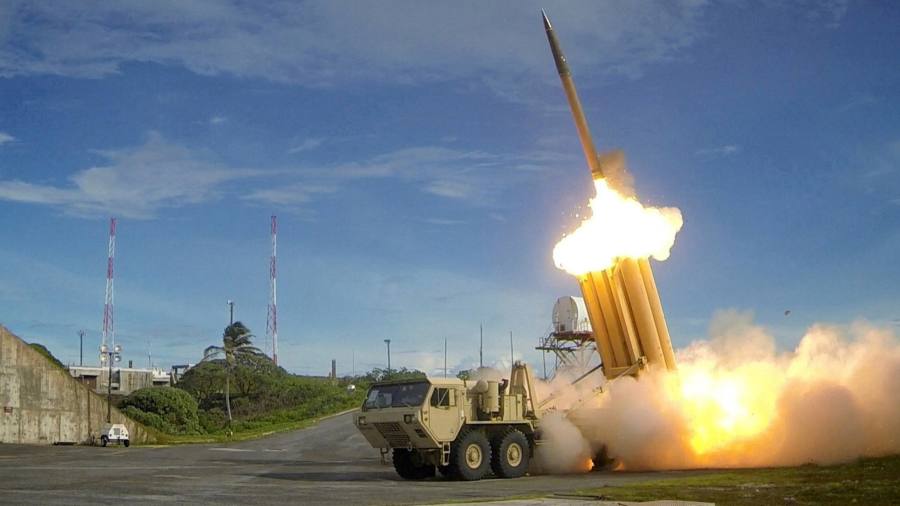South Korea and Japan’s deepening defence co-operation is triggering alarm in China, as the US seeks to rally its east Asian allies amid increasing regional tensions.
Tokyo and Seoul sealed an agreement to share real-time information on North Korean missile launches along with the US at the Shangri-La Dialogue security conference in Singapore this month.
The announcement, which followed a diplomatic breakthrough between Seoul and Tokyo this year, risks stoking anger in Beijing, which has discouraged South Korea from closer economic and defence ties with the US and Japan — a longstanding effort that now appears to be floundering.
“China has long considered South Korea to be the weakest link of the US’s alliances in Asia because of its internal divisions over the North Korea issue and its historic problems with Japan,” said Jaewoo Choo, head of the China Center at the Korea Research Institute for National Security think-tank.
“But now, it can see Seoul getting further and further from Beijing and closer and closer to Tokyo and Washington,” Choo added. “From a Chinese perspective, the problem is starting to spiral out of control.”
South Korea has traditionally taken a conciliatory approach towards China, its largest trading partner and a powerful security stakeholder in the divided Korean peninsula.
But relations have soured since 2016, when Beijing imposed an unofficial economic blockade on South Korean consumer goods companies after Seoul acquired the US-made Terminal High Altitude Area Defense (Thaad) anti-ballistic missile system.
In 2017, South Korea’s leftwing president Moon Jae-in offered a series of assurances known as the “three nos”. Seoul undertook not to add new batteries to the Thaad system, not to participate in a US missile defence network and not to join a trilateral military alliance with the US and Japan.
Jingdong Yuan, associate professor at the University of Sydney, said the “three nos” only emboldened Beijing to exert more pressure. “When you show your humility, you appear to be weak and China will double down.”
Now, Seoul is pushing back under conservative president Yoon Suk Yeol, who was elected last year promising greater “strategic clarity” on China.
Yoon, whose administration has made it clear that it does not consider itself bound by Moon’s “three nos” policy, provoked outrage in Beijing in April when he blamed tensions over Taiwan on China’s “attempts to change the status quo by force”.
Yoon’s comments exacerbated Chinese anxieties about a diplomatic breakthrough between South Korea and Japan. The previous month, Yoon and Japan’s prime minister Fumio Kishida announced a series of measures to ease a trade dispute stemming from Japanese wartime forced labour, hailing a “new era” in bilateral relations.
Yoon has also floated the possibility of Japan joining a new US-South Korea nuclear planning initiative.
While that prospect has been played down by South Korean officials, experts said it indicated that defence co-operation involving the US and two of its most important Asian allies was likely to intensify.
“China has always understood that South Korea is a close ally of the US, and Beijing doesn’t mind this as long as the alliance is focused squarely on the Korean peninsula,” said Sheen Seong-ho, professor of international security at Seoul National University.
“The problem is when the alliance’s focus appears to shift to the wider region,” he added. “South Korea is getting closer to Japan at a time when Japan is becoming more hawkish on China, and so naturally China sees this as a threat.”
Sheen said China’s aggressive response to South Korea’s Thaad deployment in 2016 had limited its current options.
“They over-reached after Thaad, and they contributed to a serious deterioration in Korean public attitudes towards China,” said Sheen. “They seem to have recognised that they can’t push Seoul too far.”
According to South Korean media reports, Chinese officials have warned their Korean counterparts that high-level diplomatic exchanges would be suspended and co-operation on North Korea policy withdrawn if Seoul crossed Beijing’s red lines on Taiwan and military co-ordination with Tokyo and Washington. Seoul has denied the reports.
In particular, Beijing is concerned that in the event of a conflict over Taiwan, US military bases in South Korea could “play a similar role” to those in Japan, according to a Chinese scholar based at a large mainland university who preferred not to be named because of the sensitivity of the issue.
“Frankly speaking, the current relationship between China and South Korea is not good, and there is a risk of further deterioration,” Xing Haiming, China’s ambassador to South Korea, told a Korean radio programme last month.
On Friday, South Korea’s foreign ministry summoned Xing to complain after he warned Seoul against making the “wrong judgment” on US-China competition in a meeting with South Korea’s opposition leader.
“Those who bet on China’s defeat will definitely regret it,” Xing said, according to a statement released by the embassy. In response, members of South Korea’s ruling party complained that China regarded South Korea as a “vassal state”.
Choo said Beijing was likely to adopt subtler means to exert pressure. South Korean tech giant Naver has suffered unexplained severe service disruptions in China in recent weeks.
“With Naver, the Chinese are sending a veiled threat that actions against the Korean tech and entertainment sectors are on the table,” said Choo.
Sheen added that the tensions between Beijing and Seoul would worsen the diplomatic impasse over the growing nuclear threat from North Korea.
China has repeatedly blocked US-led UN Security Council resolutions condemning Pyongyang’s ballistic missile programme, most recently after a failed military spy satellite launch.
“China wants South Korea to know that if Seoul challenges what it regards as its core interests in the Taiwan Strait, then Beijing will do the same on the Korean peninsula,” said Sheen. “The result is a very worrisome cycle.”
Credit: Source link











